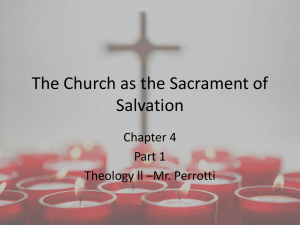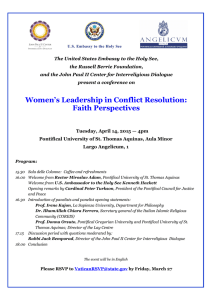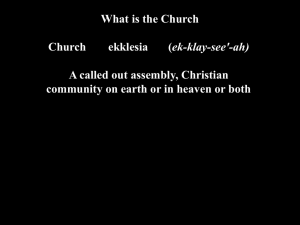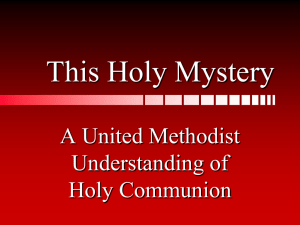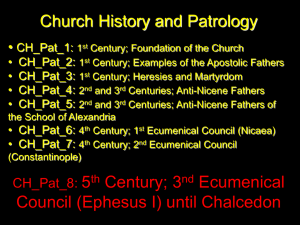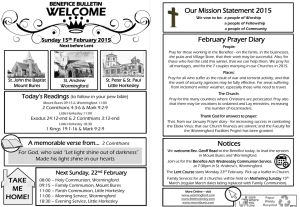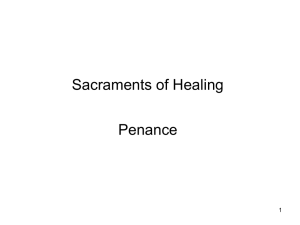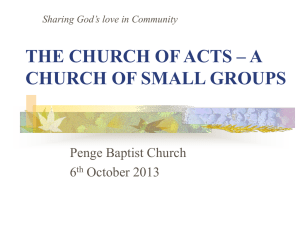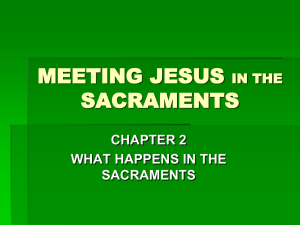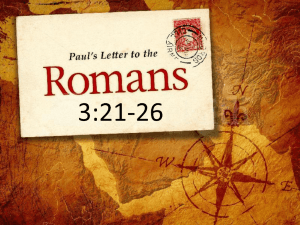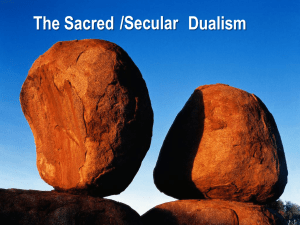The Church - Midwest Theological Forum
advertisement
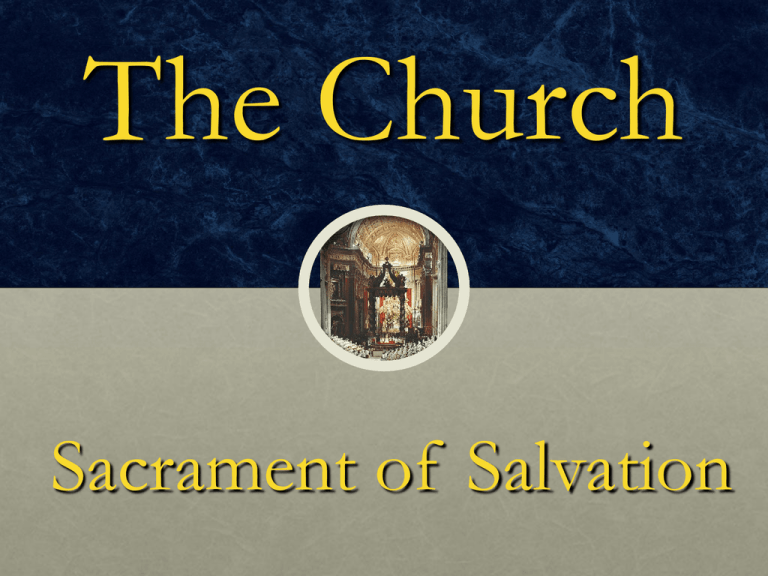
The Church Sacrament of Salvation The Church Chapter 4 Chapter 4 The Church as Sacrament of Salvation Chapter Objectives The student will be able to understand: • The Church as the Sacrament of Salvation • The Church as mystery • The Church as Sacrament of Communion • The hierarchical structure of the Church • The office of the papacy • The Roman Curia • The office of bishop • Ecumenical Councils • The office of priest • • • • • • The office of deacon The Magisterium The Deposit of Faith The development of doctrine Infallibility The sanctification of the members of the Catholic Church • Salvation of those outside the Church • Evangelization Keys to Chapter 4 • The Church is both the sign and the means of the salvation of the world. • Christ gave the Church a hierarchical authority to teach, rule, and sanctify all the members. • The bishops, led by the Pope, exercise a servant leadership with the help of priests and deacons. • The Church both teaches and sanctifies. For Discussion: • What does it mean to say that the Church is the Sacrament of Salvation? • What is the meaning of the word church? • How is the Church both visible and invisible? • What is the role of the papacy in the Church? • What are the three levels of the Church’s hierarchy, and what is the function of each? • What does it mean when we say, “Outside the Church there is no salvation”? The Church is the Sacrament of Salvation and Communion Lesson Objectives •The Church as Sacrament of Salvation •The Church as mystery •The Church as Sacrament of Communion The Church is the Sacrament of Salvation and Communion Basic Questions What does it mean to say that the Church is the Sacrament of Salvation? The Church is a Sacrament of Salvation because she is both a sign and instrument of God’s salvation for humanity. The Church is the Sacrament of Salvation and Communion Basic Questions What does it mean to say that the Church is a mystery? The Church is a mystery with human and divine, visible and invisible, and horizontal and vertical dimensions. The Church is the Sacrament of Salvation and Communion Basic Questions What does it mean to say that the Church is the Sacrament of Communion? The Church is a Sacrament of Communion because she is God’s instrument to bring men into communion with God and with each other through the grace of the Sacraments. Focus Question How is the Church’s nature akin to the nature of Christ? Just as Christ is one Divine Person with two natures, the Church is also a single reality with a dual composition: human and divine. Focus Question How does the Church fulfill man’s nature as a social being? Man’s nature and deepest need as a social being is to be in communion with God and neighbor. Focus Question How is the Church a “mixed composition”? The visible Church on earth is comprised of human members who are sinners and subject to the weaknesses of the flesh, yet who are also on the way to holiness. Focus Question Even though the Church on earth is made up of sinful members, why is the Church, herself, not sinful? The Church is holy and without sin because she is the Mystical Body of Christ. Focus Question Why is the Church a mystery? Neither our senses nor our reason can fully unveil the reality of the Church. Focus Question How does the Church unify the human race? The Church is the instrument by which men are united with God and with one another. In Christ, the Church gathers men “from every nation, from all tribes and peoples and tongues.” Focus Question What is a Sacrament? It is a sign that accomplishes what it signifies. Extension: For example, Baptism is a sign of washing that actually purifies the soul. Focus Question What does it mean to say that the Church herself is a Sacrament of Salvation? It means that the Church is a sign of salvation and a channel through which God’s grace is conveyed to the faithful. Focus Question How is the Church “like a Sacrament,” according to CCC 775? She is a sign and instrument of communion with God and of unity among all men. Guided Exercise Write about what Christ meant when he said the following to his disciples (a message that includes all Christians, including the students themselves): “It was not you who chose me, but I who chose you and appointed you to go and bear fruit” (Jn 15:16). Focus Question What is the etymology of the Latin ecclesia, which means “church”? The Latin word used for church is ecclesia, which comes from Greek ekklesia and means an “assembly” or “to call out of.” More significantly, this was the word used throughout the Old Testament (qahal in Hebrew) to refer to Israel, the People of God. Focus Question What is the etymology of the English word “church”? The English word “church” is derived from the Greek word kyriake, which means “what belongs to the Lord.” Focus Question Who calls together the Church? Jesus Christ. Focus Question Who is the visible foundation of Christ’s Church on earth? St. Peter. Focus Question Who establishes the way the Church is governed? Christ. Focus Question What is the proper response to the call of Christ to be in the Church? Faith and cooperation. Focus Question What are the three meanings of “church,” according to CCC 752? 1. A liturgical assembly 2. A local community 3. The whole universal community of believers Guided Exercise Complete a think/pair/share using the following question: What does it mean to say that the Church is the universal Sacrament of Salvation? Focus Question In what way is the Church a visible society? The members of the Church on earth with her hierarchical leadership and her institutions and various organizations form a visible society. Focus Question In what way is the Church an invisible society? It is the spiritual community of all the members of the Church, whether on earth, in Purgatory, or in Heaven. Guided Exercise Complete a think/pair/share using the following question: How does the Sacrament of the Eucharist contribute to the Church as the Sacrament of Salvation? Focus Question What is the definition of the Church presented in this section? The Church is a community of men and women united in Christ’s fullness of grace as head of his Mystical Body. Focus Question What does the New Testament word koinonia (in Latin, communio) mean? Communion. Focus Question What are the two “spatial” dimensions of communion? The vertical dimension is communion with God and the horizontal dimension is communion among men. Focus Question What are the “visual” dimensions of communion? The invisible dimension is the intimate communion with the Holy Trinity and other human beings. The visible dimension is communion in the teaching of the Apostles, in the Sacraments, and in the hierarchical order. Focus Question How does an individual enter into the Church’s communion? By faith and Baptism. Focus Question How does Christ build up and sustain the members of his Mystical Body on earth? Through the Eucharist. Focus Question How is the Eucharist the source of communion among the members of the Church? The Eucharist unites each member of the Church with Christ himself. Focus Question What Greek and Latin words express the very essence of the Church? Greek koinonia and Latin communio. Focus Question Why do we refer to receiving the Eucharist as receiving communion? As St. Paul says, the bread and wine is a koinonia or communio or participation in the Body and Blood of Christ. Authority in the Church: The Hierarchy and the Papacy Lesson Objectives •The hierarchical structure of the Church •The office of the papacy Authority in the Church: The Hierarchy and the Papacy Basic Questions What is the hierarchical structure of the Church? Christ endowed the Church with a hierarchical structure in which those in authority—the Pope and those bishops, priests, and deacons in communion with him—serve the members by teaching, ruling, and sanctifying them. Authority in the Church: The Hierarchy and the Papacy Basic Questions What is the papacy? The Pope is the apostolic successor of St. Peter and shares St. Peter’s authority to rule the Church, possessing the gift of infallibility in defining doctrines of faith and morals. Focus Question Who remains forever the chief cornerstone and shepherd of souls? Even though Christ made St. Peter (and his successors) the chief pastor of his Church on earth, Christ himself remains the head of the Church. Focus Question What is infallibility? It is a guarantee, made by Christ, that St. Peter and his successors would be free from error in their public teachings on matters of faith and morals. Guided Exercise Complete a focused reading of the final four paragraphs of the section “The Hierarchical Structure of the Church” (p. 114) using the following question: How is the Church’s attitude to authority different from the world’s? Focus Question What is the college of bishops? It is the bishops of the Church with the Pope as their head. Focus Question What is Apostolic Succession? It is the line of bishops that stretches back to the Apostles, each consecrated by the previous one. Focus Question What are the three distinct ministerial offices within the Church? They are the episcopacy (bishops), the presbytery (priests), and the diaconate (deacons). Focus Question Where do bishops, priests, and deacons get their authority and powers? Their authority comes from Christ. Focus Question What is the equality and inequality in the visible Church on earth? There is a true equality of dignity among the faithful with each member contributing to the Church’s mission. At the same time, the Church’s government is hierarchical; some members, because of the graces available through their ordained roles, possess greater authority than others. Focus Question Why is the Church not a democracy? In a democracy, political power derives from the consent of the people. The power of the Church comes from Christ, not from the baptized members. Focus Question Which Sacrament imparts the ministerial authority of Christ? The Sacrament of Holy Orders. Focus Question Who comprises the Church’s hierarchy, or sacred order? It includes the clergy, that is, bishops, priests, and deacons. Focus Question Why is it logical that Christ should establish his Church with a particular organization? Every kingdom needs a certain organization in order to endure, and the kingdom that Christ established is to endure until the end of time. Focus Question When was the hierarchy of the Church established? Christ established it when he chose the Twelve. Focus Question Why was the hierarchy of the Church established? To pass down the Apostles’ authority and traditions, so that the Church would continue the course Jesus Christ had set for it. Guided Exercise Examine one of the six examples of St. Peter exercising authority over the early Church. Explain the example and what it indicates about his role. Focus Question How do the Roman Pontiff and the bishops correspond to St. Peter and the Apostles? The Apostles were a collegial body with St. Peter as their head. The bishops are the successors of the collegial body of the Apostles with the Roman Pontiff, the successor of St. Peter, as their head. Focus Question What three tasks did Christ entrust the College of the Twelve? They are to teach, rule, and sanctify the Church. Focus Question In what ways do the successors of the Apostles teach, rule, and sanctify? The bishops with St. Peter’s successor as their head preach the Gospel faithfully, rule the Church by service, and sanctify the Church through the Sacraments. Focus Question What is one of the most important duties of a cardinal? He acts as a papal elector. Focus Question What is a conclave? It is a papal election that takes place in the Sistine Chapel. Focus Question How many votes does a candidate need to be elected Pope? He needs a vote of two-thirds of the cardinals. Focus Question What is the significance of white and dark smoke coming from the chimney of the Sistine Chapel? Dark smoke indicates a ballot has been cast but there is no winner. White smoke means a Pope has been elected. Guided Exercise Complete a think/pair/share using the following question: Why is it prudent that the papal electors be locked inside the Sistine Chapel until a Pope is elected? Authority in the Church: The Roman Curia Lesson Objectives •The Roman Curia Authority in the Church: The Roman Curia Basic Questions What is the Roman Curia? The Roman Curia currently consists of the Secretariat of State, nine Congregations, three Tribunals, and twelve Pontifical Councils, which assist the Roman Pontiff in governing the Church throughout the world. Focus Question What is the Roman Curia? It is the administrative, or governing, body of the Catholic Church that assists the Pope. Focus Question Of what does the Roman Curia presently consist? It includes a Secretariat of State, Congregations, Tribunals, and Pontifical Councils. Focus Question What does the Secretariat of State oversee? He handles political and diplomatic functions of the Catholic Church. Focus Question What is the role of the Secretariat of State section for General Affairs? They handle the everyday administration. Focus Question What is the role of the Secretariat of State section for Relations with States? They handle the Vatican’s diplomatic relations with civil governments. Graphic Organizer Complete the following table to see the purpose of the various congregations of the Curia. Congregation Function The Congregation for the Doctrine of the Faith The Congregation for Oriental Churches The Congregation for Divine Worship and the Discipline of the Sacraments The Congregation for the Causes of Saints continued Graphic Organizer Complete the following table to see the purpose of the various congregations of the Curia. Congregation The Congregation for Bishops The Congregation for the Evangelization of Peoples The Congregation for the Clergy The Congregation for Institutes of Consecrated Life and for Societies of Apostolic Life The Congregation of Seminaries and Educational Institutions Function Graphic Organizer Complete the following table to see the purpose of the various councils of the Curia. Council Function Pontifical Council for the Laity Pontifical Council for Promoting Christian Unity Pontifical Council for the Family Pontifical Council for Justice and Peace Pontifical Council Cor Unum (“With One Heart”) continued Graphic Organizer Council Pontifical Council for the Pastoral Care of Migrants and Itinerant People Pontifical Council for Pastoral Assistance to Health Care Workers Pontifical Council for the Interpretation of Legislative Texts Pontifical Council for Inter-Religious Dialogue Pontifical Council for Dialogue with Non-Believers Pontifical Council for Culture Pontifical Council for Social Communications Function Focus Question What is a tribunal? It is a court. Focus Question What is the role of the Apostolic Penitentiary? It grants absolutions and dispensations in matters reserved to the Holy See. It also has authority over the granting and proper use of indulgences. Focus Question What is the role of the Supreme Tribunal of the Apostolic Signatura? It ensures that justice in the Church is correctly administered. Focus Question What is the role of the Tribunal of the Roman Rota? It is an appellate court charged with safeguarding rights within the Chrurh and with providing assistance to lower tribunals. Authority in the Church: Bishops, Priests, and Deacons Lesson Objectives •The office of bishop •Ecumenical Councils •The office of priest •The office of deacon Authority in the Church: Bishops, Priests, and Deacons Basic Questions What is the episcopy? Bishops are the successors of the Apostles who exercise the fullness of the priesthood of Christ. They serve the people of God in their dioceses and remain in fellowship with their brother bishops, concerned with the universal needs of the Church. Authority in the Church: Bishops, Priests, and Deacons Basic Questions What is an Ecumenical Council? An Ecumenical Council is a meeting of all the bishops of the world under the authority of the Pope. Authority in the Church: Bishops, Priests, and Deacons Basic Questions What is the priesthood? A priest assists the diocesan bishop in the office of the priesthood of Christ, usually taking care of the people of the parish. Authority in the Church: Bishops, Priests, and Deacons Basic Questions What is the diaconate? Deacons are ordained to provide a ministry of service. Focus Question How do bishops have both a local and a universal focus? As heads of particular Churches, they take care of their own dioceses, assisted by their priests and deacons. As members of the Episcopal college they are concerned with the challenges facing the universal Church. Focus Question What is a cathedral? It is the official church of the local bishop. Focus Question Where does the word cathedral come from? Kathedra, a Greek word meaning “chair,” is a real or figurative chair from which a wise man teaches and guides. Focus Question What is the kathedra Mouseos? It literally means the teaching authority of Moses. By extension, it was the seat of religious and moral authority that the scribes and Pharisees figuratively occupied. Focus Question How was the kathedra the Lord promised the Apostles superior to the seat the scribes and Pharisees occupied? Jesus promised the Twelve they would sit on thrones, judgment seats suitable for kings. Focus Question What name did the Apostles give their office in the Church? Each considered himself an episkope, which means “overseer.” Extension: The word “bishop” is derived from episkope. Focus Question In whose place did the bishops preside, according to St. Ignatius of Antioch? They preside “in the place of God.” Focus Question What is the role of the Secretariat of State section for Relations with States? They handle the Vatican’s diplomatic relations with civil governments. Guided Exercise Do an online search to view some of the cathedrals of Europe to get an idea of the incredible architectural heritage of Christianity. Focus Question What Sacrament can only be celebrated by bishops? The Sacrament of Holy Orders in which they ordain a baptized man to the episcopacy, the priesthood, or the diaconate. Focus Question What is the role of a bishop in a particular church (specific diocese)? He acts as Christ’s chosen representative and the legitimate pastor of all the faithful within that diocese. Focus Question What is a bishop’s conference? It is an organization of bishops within a geographical area that helps the bishops to coordinate their activities. Focus Question What is an Ecumenical Council? It is a meeting of the bishops of the whole Church. Focus Question What was the first Ecumenical Council? The Council of Jerusalem was a prototype for later councils. The first Ecumenical Council was the First Council of Nicæa, which met AD 325. Focus Question Who pronounced the decisive verdict at the first council, after much debate? St. Peter. Focus Question What did the first six Ecumenical Councils address? In essence, they addressed the question, “Who is Jesus Christ?” in response to various Trinitarian and Christological heresies. Focus Question What does “ecumenical” mean? It means from the whole, inhabited world. Focus Question Why do the Eastern Orthodox Churches not recognize any of the Ecumenical Councils held in the West after 787? The local churches in the eastern half of the Roman Empire did not participate in these Ecumenical Councils. Focus Question What was the most recent Ecumenical Council? The Second Vatican Council (1962-1965) is the most recently held. Guided Exercise Perform a paragraph shrink on the paragraph beginning, “Current canon law…” (p. 122) to understand the Pope’s authority over an Ecumenical Council.
